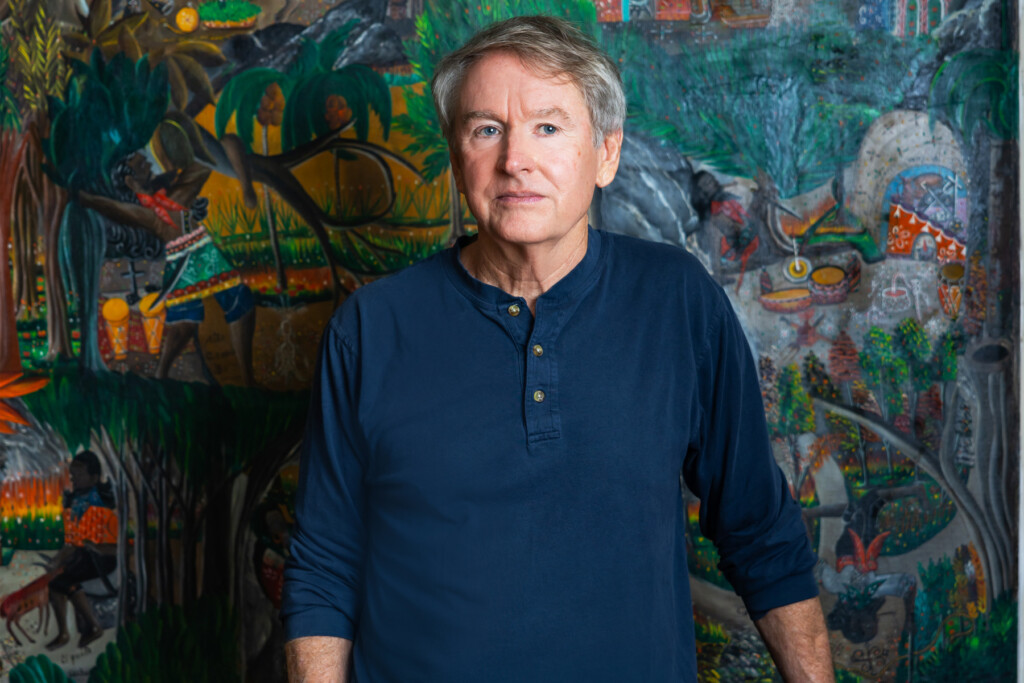Ben Fountain has been trying to write a novel about Haiti for almost the entire time he’s been writing about anything. Or, he’s been thinking about writing one. For three decades, give or take.
Fountain first went to the Caribbean country—often in upheaval for two centuries, often due to external forces—in May 1991. He was in his early 30s and had given up on practicing law just three years earlier to make a go of it as a writer. He would, of course, eventually succeed, with two bestselling books and too many awards to responsibly list here. But that was a long way away then. He arrived in Haiti with little more than an idea, and the idea was little more than that.
“I felt like things were happening there that I needed to try to understand: how power works, why the world is the way it is, how history, race, politics, capitalism—how all those things affect the course of individuals’ lives,” he says. “And how people try to eke out a little bit of autonomy and agency in the midst of these huge structures that control so much of who we are and what we do. I felt like Haiti was the boiling point for that.”
A few months after that initial trip, a coup d’état by the Forces Armeés d’Haïti sent President Jean-Bertrand Aristide into exile, where he would remain until 1994. In the years to follow, Haiti would be beset by more political violence, as well as natural disasters (among them, a magnitude 7.0 earthquake in January 2010) and disease (most notably a cholera outbreak, likely caused by United Nations peacekeeping forces, that has persisted for more than a decade). I went to Haiti to report a story in 2012 and found a country practically vibrating with chaos, a brightly colored ruin held together by its people and seemingly little else.
But the turbulence didn’t stop Fountain from returning again and again over the next quarter century, even after his first attempt at a Haiti-set novel failed.
“It was bad,” he says of the book, now shipwrecked in a storage unit somewhere. It’s a summer Sunday afternoon and Fountain is at his North Dallas home, dressed accordingly, in well-worn khakis and a faded blue t-shirt. We are at a dining room table that sees more books than meals—there are 30 or so of the former divided in uneven stacks on the other end from where we sit, Fountain with an open but untouched bottle of Topo Chico at hand. The walls of this room, and the one he led me through to get here, are covered in Haitian paintings, lurid folk art canvases that speak of life and death and some mystical in-between.
“But almost everybody’s first novel is bad,” he continues. “I spent a lot of years on it. I worked very hard on it. It was a necessary failure. And it got me going to Haiti and kept me going to Haiti. And by the time I finished that novel, I was connected, and I didn’t want to stop going. I wanted to stay involved. There is nothing from that novel in this novel.”
“This novel” is Devil Makes Three. Due out this month, it is, at long last, Fountain’s Haiti novel, a beautiful brick of a book that begins its 544 pages the day after the 1991 coup and chronicles a year or so of its aftermath. Throughout, he surveys the country’s crumbling and corrupt pillars with the kind of disgust that can only come from a place of love. And though it dives deep into the country’s politics and history, into Voudou tradition and lingering ghosts, Devil Makes Three is, in its way, something of a pirate novel, so there is sex and adventure and actual buried treasure.
The story starts from the perspective of two U.S. expats—Matt, who has a fledgling scuba business, and Audrey/Shelly, a budding CIA operative—but eventually the narrative belongs as much, if not more, to Misha, a Haitian American student. She is discovering herself and rediscovering her country—what it means to her and what she could potentially mean to it.
Misha was not intended to be one of the main characters, but she forced her way in, as Fountain realized he “had to let the book go where it wanted to go.” He had to read what she had already read, centered on the scholarship of the Black Atlantic—the idea put forth by critic Paul Gilroy that the modern Black experience is a hybrid culture, brought on by the transatlantic slave trade, that is an equal blend of African, American, Caribbean, and British. (There is a syllabus scattered throughout Devil Makes Three, if you wish to do the same.)
“There was just a lot I had to learn in order to have a chance at writing her properly,” he says.
Fountain needed time to do that work. But he is used to that by now.
Time is part of his lore. After he left behind the law in the late 1980s, it took more than a decade for him to finally catch on as a writer in a real way. (Thank goodness for his wife, Sharie, who supported the family with her own very successful legal career.) Fountain was in his late 40s when he published his first book, the bestselling story collection Brief Encounters With Che Guevara, in 2006. (Four of the pieces are about Haiti.) Brief Encounters’ surprise success and Fountain’s age led to a profile in The New Yorker by Malcolm Gladwell that essentially annointed him a genius.
But it would be another six grueling years—and one completed and subsequently abandoned book—before his debut novel, Billy Lynn’s Long Halftime Walk, came out. Billy Lynn turned out to be more than worth the trouble, another bestseller, this one a National Book Award finalist that was adapted into an Ang Lee film in 2016.
“I mean, the movie is less than successful,” Fountain says of the experience, which he compares to winning the lottery, even given the end result. “I think it fell short in a lot of areas. But the thing is, everybody was trying to make a good movie. There were no hacks. There was nobody trying to dumb it down. And, for whatever reason, it just didn’t work. I have some ideas, but I’ll keep them to myself.”
The long tail of the book might obscure the fact that the gap between Billy Lynn and Devil Makes Three is even longer than the infamous one after Brief Encounters. But this one was less taxing. “Maybe I should worry about this stuff more, but I don’t,” he says. “It took me 18 years to publish my first book, and so I got pretty Zen about the publishing part of it.”
He had started work on a follow-up in 2013, though he wasn’t always working on it. He was hired by The Guardian to file a series of dispatches from the surreal campaign trail of the 2016 presidential election, which he decided to turn into his first nonfiction book, the blistering Beautiful Country Burn Again: Democracy, Rebellion, and Revolution. He also wrote the pilot script and first season arc for a TV thriller that got derailed after one of the people developing it lost his house in a fire.
When Fountain left off working on what would become Devil Makes Three in 2016, he had 200 pages—“kind of flailing pages.” When he came back to it in 2019, after Beautiful Country, he wasn’t sure if he would continue or move on to something else, if that Haiti novel he’d been trying to write would stay just out of reach. He was leaning toward scrapping it.
“And I read those 200 pages, and I thought, There’s something here, and I really want to have another go at it,” he says. “I started at the beginning and used some of what I’d written before, but it was a different novel, and right away it felt stronger. It felt better. I don’t know, in a weird way, I think doing a nonfiction book, it made my writing muscles stronger. When I came back to the novel, things seemed a lot clearer. And maybe just because I’d been thinking about politics for the last two and a half years.”
Fountain had to finish Devil Makes Three without going back to Haiti; he hasn’t visited since 2016. He planned to start going again in 2019 after finishing Beautiful Country, “and by then it had become excessively dangerous to go. Kidnapping had become an industry, and so all my friends were saying, ‘Don’t come, don’t come.’ And it’s only gotten worse since then.”
To that point, the day after we talked, The New Yorker published a story by Jon Lee Anderson detailing the current situation in Haiti, which has been without an elected leader since President Jovenel Moïse was assassinated, in 2021. (Prime Minister Ariel Henry is the acting president.) According to one diplomat in the region who spoke to Anderson, it is “a time when most institutions are no longer functioning. Justice is completely broken. There have been no criminal trials in five years. Education is very damaged.” A U.N. report says that 1,000 people have been kidnapped this year and another (at least) 2,000 killed, among them 34 police officers.
So Fountain will wait. In the meantime, he’s 65 pages into a new novel, an idea that he came up with in 2021 and started working on in earnest in March. “For once in my life, the pages are coming fast,” he says. Even if that changes, he’ll deal with it the way he always has, working every day, taking as long as he needs to.
“I’ve been writing most of my adult life, and I’m about to publish only my fourth book,” he says. “It’s kind of ridiculous. But I like every one of the four. I put it all out there. I did the best I could with each one—never cut corners, never tried to fluff over weak parts. Just kept working them. I will say this: I feel like I’m just getting started.”
This story originally appeared in the September issue of D Magazine with the headline, “The Killer of Darlings.” Write to [email protected].
Author








